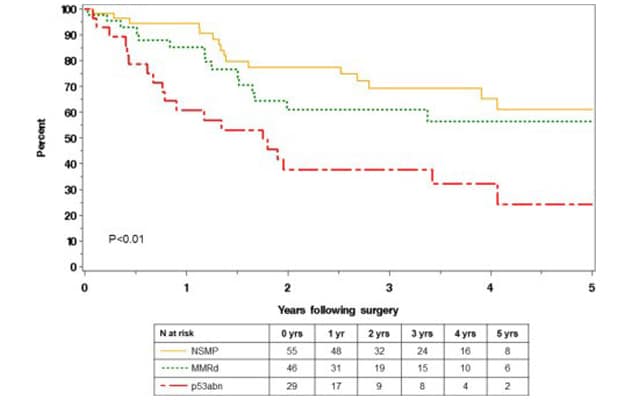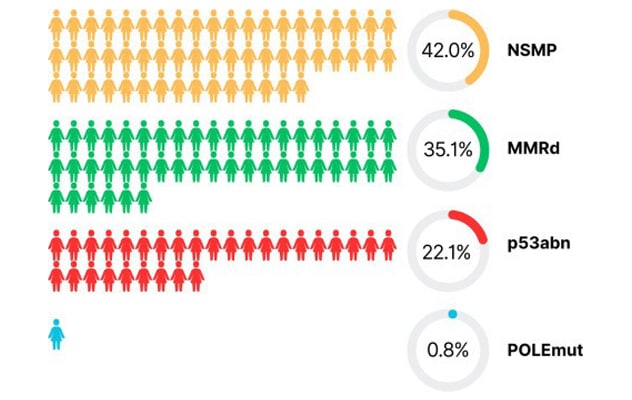Aug. 21, 2025
Recurrence-free survival by molecular class

Recurrence-free survival by molecular class
MMRd, mismatch repair deficient; NSMP, no specific molecular profile; p53abn, p53 abnormal.
Investigators from Mayo Clinic in Minnesota wondered if molecular classification would account for recurrence-free survival variability in patients with endometrial cancer, including lymph node metastasis (stage 3C). To study this, Mayo Clinic and two international centers combined their patients with stage 3C endometrial cancer and compared their outcomes based on molecular analysis. A difference in recurrence-free survival based on molecular class was not present, as noted in an October 2024 publication in International Journal of Gynecological Cancer.
"These findings were surprising," says Gretchen E. Glaser, M.D., study author and gynecologic oncologist at Mayo Clinic in Minnesota. "We expected molecular class and lymph node metastases would change a patient's prognosis. But it really didn't."
Dr. Glaser says she and investigator colleagues conducted this study due to a dearth of literature examining stage 3C endometrial cancer to determine if molecular class impacted prognosis. She notes that incorporating molecular analysis may help to individualize treatment for advanced cancer, especially adjuvant therapy such as chemotherapy, targeted agents and radiotherapy.
Because of this study's findings, the research team indicates that molecular classification is not useful in isolation from pathological characteristics. The researchers recommend molecular classification's use alongside traditional histopathologic parameters to determine a patient's prognosis, thus individualizing the treatment process.
The goal of this type of treatment is to be able to understand each patient's particular endometrial cancer, offer good information about it, and provide precisely the right amount of treatment required for that patient.
"We want to maximize effectiveness while minimizing side effects," says Dr. Glaser. Stage 3C endometrial cancer, according to the revised 2023 International Federation of Gynecology and Obstetrics staging system for endometrial cancer, indicates disease is present in pelvic and/or periaortic lymph nodes. Metastases in this stage range from micrometastasis, at 0.2 to 2 mm in diameter, to macrometastasis, which are greater than 2 mm.
Study design and findings
 Distribution among molecular classes
Distribution among molecular classes
MMRd, mismatch repair deficient; NSMP, no specific molecular profile; p53abn, p53 abnormal; POLEmut, POLE mutated.
This retrospective study included 131 patients with stage 3C endometrial cancer with the following molecular characteristics:
- 55 (42%) no specific molecular profile (NSMP).
- 46 (35.1%) mismatch repair deficient (MMRd).
- 1 (0.8%) POLE mutated.
- 29 (22.1%) p53 abnormal.
Over a follow-up period of five years, investigators found endometrial cancer recurred in 50, or 38.2%, of these patients, with a median time to recurrence of 1.2 years. The follow-up period for the other 81 patients extended for a median of 3.1 years. Among these patients studied, however, the investigators found that NSMP accounted for the significant differences in recurrence-free survival. When they adjusted for lymph node metastasis, tumor grade and histologic type, the molecular classification was found to be insignificant in recurrence-free survival. Yet when they adjusted for lymph node metastasis, histologic type and adjuvant therapy administered, molecular class did indicate some level of significance.
Mayo Clinic in Minnesota and endometrial cancer testing
Mayo Clinic's Minnesota campus has its own in-house molecular testing for patients with endometrial cancer. Dr. Glaser notes she finds this extremely useful, as sending out this type of test for analysis typically takes up to six weeks to see results and is not available in all U.S. regions, whereas the turnaround time at Mayo Clinic is much shorter.
For all patients diagnosed with endometrial cancer at Mayo Clinic, tumor testing directs the prognosis and treatment used. After testing is complete, the surgeon caring for the patient takes the patient's case to the Mayo Clinic Tumor Board for discussion and direction.
"We need more information related to the molecular classification of all stages of endometrial cancer. However, the future looks brighter than ever for giving patients substantial information about their tumors. The endometrial cancer field is moving quickly."
Future directions for understanding each endometrial cancer
International studies based on molecular class are ongoing. Dr. Glaser says that a prospective study similar to the one published in International Journal of Gynecological Cancer would be a significant addition to the body of research on endometrial cancer.
"We need more information related to the molecular classification of all stages of endometrial cancer," says Dr. Glaser. "However, the future looks brighter than ever for giving patients substantial information about their tumors. The endometrial cancer field is moving quickly."
For more information
Schivardi G, et al. Impact of molecular classification on recurrence risk in endometrial cancer patients with lymph node metastasis: Multicenter retrospective study. International Journal of Gynecological Cancer. 2024;34:1561.
Refer a patient to Mayo Clinic.